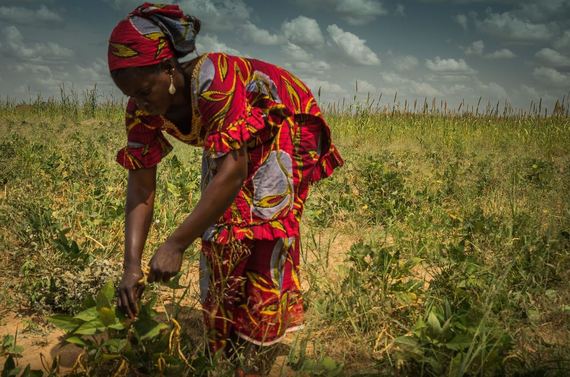In Cinzana, Mali, cooperative vegetable gardens were established with access to water, tools & land, to diversify their food and livelihoods (Photo:UNDP)
After last year's successful adoption of the Paris Agreement, climate negotiators and activists are now on their way to Morocco. Marrakesh will host the 2016 climate summit, COP22, which has been presented as the COP of implementation, as they will focus on the nuts and bolts. Dangerous climate change requires courageous climate action. Meeting the targets set out by the Paris Agreement is simply essential to our safety and prosperity, and will not only help address rising global temperatures but also enable a host of other benefits, from food to jobs to health and sustainable growth. The entirety of our development rests on the actions we take to address climate change. Better if aiming at under 1.5 degrees.
Take Morocco and the North of Africa to understand how robust climate solutions can offer tangible development benefits. According to the Max Planck Institute, temperatures in this region are set to rise twice as fast as on the global level, potentially rendering large parts uninhabitable and impacting economies, water access, and food security. If unaddressed, we risk straining social and economic systems across a region that has already seen its share of conflict and migration, leading potentially to instability, displacement and demographic pressure on urban centers.
These issues are interconnected. Whether we are discussing democratic governance or disaster risk reduction, many of the conversations come back to climate change and the threat posed by inaction. Thankfully, countries - the architects of both the Paris Agreement and the Sustainable Development Goals - are aware of this risk and pushing for cohesion. A first and important step in this regard would be to recognize that the country based climate targets inspired by Paris - the so-called Nationally Determined Contributions (NDCs) - can serve as the blueprint to bring together climate action and sustainable development work.
Many countries, such as Morocco and Sudan, have already taken the opportunity to bring their national climate strategies in alignment with their national sustainable development plans. Access to clean energy and its benefits for development are widely referred to in country climate programming. In recognition that growth isn't sustainable if it isn't climate proof, 86 percent of countries have also included resilience measures in their national targets. A typical NDC contemplates government and private sector action on a broad range of issues, from consumption and production patterns to water security, renewable energy, transportation, air quality and urban planning.
Some countries, like Niger, made the smart move to deliberately prioritize emissions reductions that also foster resilience, in particular income generation opportunities. Still others designed their national climate plans as the catalyst for transforming their economies. Chad, for instance, one of the poorest and fragile countries in Africa, is looking at diversifying its economic base to reduce its dependence on oil exports. Morocco, Algeria and Egypt are all investing in their vast solar and thermal deposits to not only generate clean energy for their populations, but also position themselves as future clean energy exporters.
After Marrakesh
We can already see the direction climate action will take in 2017 and beyond. Some countries will base their public policies on emission profiles per sector. Others will set up or strengthen national financial and budgetary mechanisms that flexibly draw and allocate funds for climate-infused projects across sectors. Rwanda's pioneering environment and climate change investment fund is a good model of national capitalization that has attracted external co-financing. International climate finance can help: the Argan forest of Morocco, covering 2.5 million hectares, is recognised by UNESCO as a Biosphere Reserve with a rich biodiversity. The "market boom" in argan oil, and its rising demand has improved household income for local communities but generated serious pressure on the natural forest, threatening its sustainability. The forest is also threatened by the impact of climate change upon its regeneration. Morocco has recently secured short of US$40 million from the Green Climate Fund (GCF) for developing Argan orchards in degraded lands, not only addressing desertification but also improving income generation for women farmers.
The climate fight takes place as much in rural areas as in urban centres, and national public policy is as important as municipal action. Cities are actually on the frontlines of climate solutions. Mayors have already pledged more than 2,000 climate commitments. At Habitat III, the UN conference on housing and sustainable urban development, Mayors of the world's major cities called for increased investment in low-carbon projects, with UNEP's support. Recognizing a similar need among smaller municipalities, UNDP is currently developing a programme for second and third tier cities in Asia's Mekong Delta to build local capacities for municipal climate finance.
The adoption and bringing into force of the Paris Agreement on climate change has been hailed as a "historic milestone that enshrines the world nations' commitment to achieving a universal model for development gradually reducing greenhouse gas emissions " as said in the historic award by Spain of the Prize Princess of Asturias to the United Nations Framework Convention on Climate Change (UNFCCC), a United Nations entity embodied by its current and past Executive Secretaries, Patricia Espinosa and Christiana Figueres. The torch has now been passed to Marrakech to ensure that this year's climate summit remains known as the turning point for a climate-resilient, zero carbon future.
This post is part of a series produced by The Huffington Post, in conjunction with the U.N.'s 22nd Conference of the Parties(COP22) in Morocco (Nov. 7-18), aka the climate-change conference. The series will put a spotlight on climate-change issues and the conference itself. To view the entire series, visit here.

